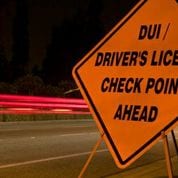 According to North Carolina’s General Statute § 20-16.3A, the state permits law enforcement officers to set up periodic checking stations and roadblocks, also known as “checkpoints.” N.C. Gen. Stat. § 20-16.3A(2012).
According to North Carolina’s General Statute § 20-16.3A, the state permits law enforcement officers to set up periodic checking stations and roadblocks, also known as “checkpoints.” N.C. Gen. Stat. § 20-16.3A(2012).
Moreover, the statute allows officers to pull over any vehicle with the intent to request from the drivers their driver’s licenses, vehicle registration, or insurance information. Id.
The county is allowed to operate under a written policy that provides guidelines for the pattern in which the officers will use for the checkpoints, which need not be in writing. They are permitted to use their own agent’s policy, or adopt one from a neighboring county if they so chose. Id.
However, the caveat is that no individual officer may be given discretion as to which vehicle is stopped or which driver is required to produce certain documents, and which ones are not. In other words, it is an ” all or nothing” when it comes to stopping the vehicles stopped. The police are however required to have, at minimum, at least one patrol car with its blue light operating to give notice to the approaching drivers.Id.
If an officer is given reasonable suspicion that the consumption of alcohol as occurred by the driver say, for example, by smelling a strong odor, the officer is permitted to ask the defendant to submit to a alcohol screening test. If the driver refuses, then the officer is entitled to investigate further as understood in the implied consent laws. Id.
If you have been stopped at a checkpoint and charged with any of the aforementioned citations, contact the law offices of Robert J. Reeves toll-free at 877-374-5999 for help with your criminal defense. Mr. Reeves is experienced in all aspects of criminal defense, and would be personally available for a consultation to discuss your options. For more information, visit our main page here.
